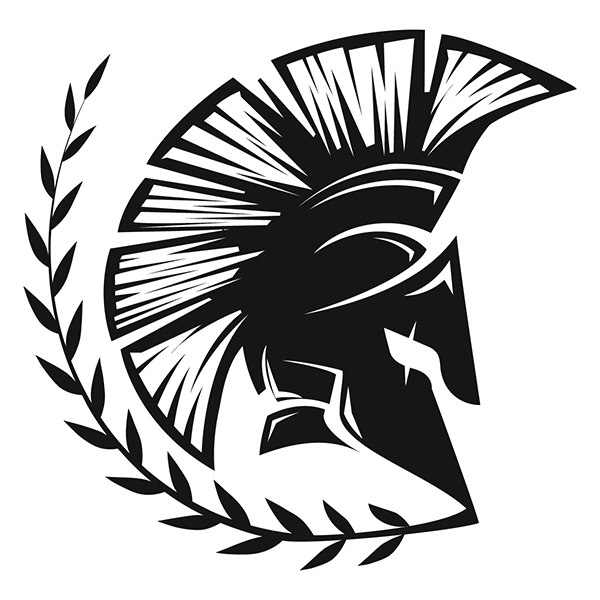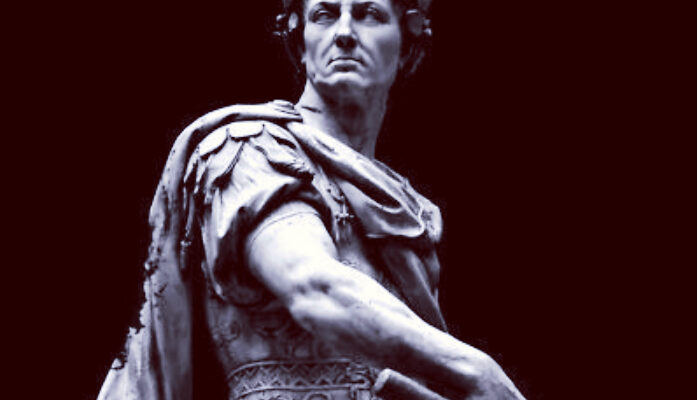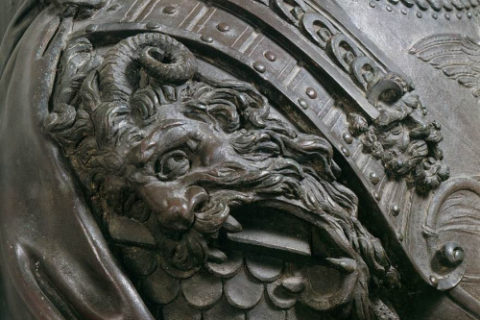The Roman Republic formed and thrived.
Then it degenerated into the Roman oligarchy, as all republics do.
There was an entrenched political elite that operated alongside a financial/cultural elite to suppress—and financially enslave—the average people.
Sound familiar? This oligarchy largely resembles our own situation (us plebs against our ruling class).
Julius Caesar devised a solution. That solution involved an end to the corrupt optimate Republic, in favor of the populares.
The Julius Caesar solution is twofold:
- First, chase out the optimates (oligarchs) and then make any that remain subject to the new head of state.
- Second, completely wreck the oligarch’s financialization ability over the masses.
The first is rather self-explanatory. He corrected the power cycle by putting in proper hierarchy and authority, which always falls away in degenerated periods. Unaccountable wealth should not control the state and the institutions, but in late-stage republics, it always does.
But the second point is truly fascinating, and it is something many of our own modern reformers gloss over. It is what I want to focus on for this article.
Caesar often gets a bad rap because of our corrupted history (and because of Cicero’s dramatic whinings about the man due to Cicero being an eques optimate who had much to lose personally).
If his coming and reforms were so hated as some of the biased historians claim, then why do we have ample evidence of people cheering his crossing of the Rubicon, gathering to greet him, populares joining at whim, and helping his soldiers along the way? Additionally, and perhaps more impactful, why did the oligarchs have to flee to Asia if the Republic had such superb support?
The truth is that the Republic’s ruling class oligarchs were trash. And like all trash, they needed to be and were thrown out. Just like how our own trash needs to likewise be emptied.
But not only did Caesar do so, he then also put in the monetary reforms to permanently keep them confined to the trashcan.
The reform’s primary focus was to decimate the financialization ability of the oligarchs. But they massively benefited the people in the process. Both are win/wins in my book.
The crisis of the Roman Republic lasted from 134 BC to 44 BC. But the main piece, the monetary crisis, existed around 51 BC to 44 BC. Julius Caesar reigned from 49 BC until his assassination in 44 BC. It is these monetary items that largely set the Roman Empire up for success under Augustus.
Caesar is the only person I know of throughout all of history that actually solved a debt crisis that existed alongside a monetary crisis favorably. The financial issues that existed during his short reign were massive, but you rarely hear about them because he solved them. Once the Civil War period ended and Augustus came in, only minor tweaks were needed based on Caesar’s blueprint. Pax Romana was achieved.
How’d he do it?
Julius Caesar mandated the following:
- Control of the minting process was transferred from the oligarchs to the state. This made it so the state could get seigniorage and currency control, instead of private oligarchs.
- New cheap metal coins were issued as the means of exchange. The oligarchs used gold/silver as a means of exchange previously, but they controlled the purchasing power of these through the production/distribution of the materials. Cheap metal coins kept everything tied to the state and could not be influenced privately.
- Forgiveness of all interest (usury).
- New interest could not exceed 1% per month and could not exceed the capital loaned or be compounded.
- Any interest already paid must be applied to the principal.
- Slavery was abolished as a means of settling debt.
- Restoration of property. Any property taken from usurious conditions was returned to the original owners. This included land property that was returned to the poor after being centralized for the past hundred years in the hands of a few.
- Reappraisal of loans based on true property/collateral value pre-Civil War. (I.e., You get a loan for $400,000 in construction equipment, the value crashes to $100,000. After Caesar’s adjustment, you paid the $100,000. The oligarchs could not extort everyone and simultaneously cash-in on low prices).
- Rent was cancelled for one year.
- The rich had to use their wealth, not hoard it. For instance, one law outright forbid holding more than 60,000 sesterces in cash by any one person. No rich hoarders that could then use their money for corrupt gain or influencing purchasing power through monopolization.
- State debt was immediately reduced by 25% simply by the acts conducted above. The state also then had a recurring budget surplus which could pay off further debt (but Caesar put toward other things in the year before his death).
(* Note: These are sourced from many books. Most come from Plutarch’s history, but I also used Goldsmith’s History of Rome (Gutenberg), SPQR, and A History of Central Banking and the Enslavement of Mankind.)
Even in his death, Caesar helped his people. In his will, he distributed the wealth he amassed to each citizen (300,000 sesterces to each person). He also gave up his villa, gardens, and art gallery to be made public.
This list solved the monetary crisis amicably. Both lenders and borrowers were satisfied. That never happens. The only people that fought Caesar were the holdouts in the Senate optimate oligarchy, that had to give up their looting of the masses.
The exact same kind of looting that is happening to our people right now, in modern America.
Could you imagine if we enacted these reforms today? How absolutely awesome it would be?
Vanguard could not hoard their money and farms anymore. Houses and land could not be centralized by the likes of Bill Gates and BlackRock. Interest would be capped at a measly 1%, so loans would actually be fair and affordable (not usury). The Fed would be disbanded, because they would no longer serve a purpose. No more enslavement of our average people in massive debt, both public and private. Our people could get their land and currency back.
I know people don’t like to hear it, but sometimes a strongman is needed. When a system gets overtaken by oligarchs and is hopelessly lost, sometimes you need a Caesar. You cannot go from a rule-by-few back to a rule-by-many. It is impossible. You have to get through the rule-by-one first.
The optimates are near-identical to our current corrupt ruling class republic-ites. Whether you like it or not, you are a populare. And, we need a Caesar.
Everyone always talks about learning from history or failing to repeat it. Well, if you want to learn how to solve an oligarchy, Julius Caesar provided the perfect blueprint over two thousand years ago.
We do not need to reinvent the wheel, we just need to cross the Rubicon.

A Christian, husband, father, and American dissident. Join him in seeking truth and sipping sweet tea during the collapse of the American Empire. You can find more of his work at hiddendominion.com. Eph. 5:11.






“Caesar is the only person I know of throughout all of history that actually solved a debt crisis that existed alongside a monetary crisis favorably. The financial issues that existed during his short reign were massive, but you rarely hear about them because he solved them.”
I’m sure you’re aware of another in more recent history who did the same.
Fair point, Hitler did do the same in the short term. I negated him because of the war, which just lead to another financial crisis. So the two crisis events seem to blend together even though they are separate. Whereas Caesar’s solutions were enduring even unto his successors. But still, fair objection.
Excellent article. A few months ago I read Stephen Mitford Goodson’s book ‘History of Central Banking’ mentioned in your article and it opened my eyes further to the truths of history and which tribe is responsible for much of the woes of our people. Amazing at the lies, distortions, destruction of lives, and coverups of truth by those who own all facets of media, and for the deaths of those in authority, who, like Caesar, JFK, A. Hitler etc, bucked their cash cow. Thank God for opening my eyes and May He continue to open the eyes of our Southern folk. Thank you Kaisar.
I’m not so sure that the solution to a corrupt centralized power is a new and different centralized power. “Meet your new boss, same as the old boss,” as the saying goes. Brings to mind the same cognitive dissonance in regards to our founding fathers. Their contempt for the British monarchy wasn’t that it was a corrupt and tyrannical central power, it was that they weren’t the ones in power to reap the benefits of corruption and tyranny. Hence, the prompt jettisoning of the Articles of Confederation in favor of the Constitution. The first syllable says it all: “CON.” People fail to realize that it was forged in secret by a select few without any vote of the populace, and then sold and marketed to the people via The Federalist Papers. This revered document has enabled the largest centralized government the world has ever seen. Yet, it’s wrongly perceived as being some sort of freedom generating machine. On the contrary, my friend.
I wouldn’t trace what’s happened here to the Federalist Papers … although the influence of men like Alexander Hamilton surely didn’t help. Neither the Articles nor the Constitution were immune to the machinations and manipulations of those who worshiped MAMMON. Leon Degrelle offered (I believe) an excellent perspective on different forms of government and how they all can work or be subjected to corruption:
“Democratic succession, the object of such fervid admiration, has from the first always consisted of overturning what the predecessor has done and attempting to improvise the exact opposite. … Preoccupied every other year with elections past or upcoming … democratic succession unfailingly ends in an accumulation, ever enriched, of collapsed walls. … Whereas peoples are a unity—a whole—a Right or Left is only a divisive element, artificially separating the vital forces of a nation. pp. 424-5.
Authority does not mean tyranny. A tyrant is someone who puts himself in power without the will of the people or against the will of the people. A democrat is placed in power by the people. But democracy is not limited to a single formula. It may be partisan or parliamentary; or it may also be authoritarian. The important thing is that the people have wished it, chosen it, [and] established it in its given form.” p. 106.
Leon Degrelle, ‘Hitler Democrat’
I love Degrelle. I have all his books!
He’s right at the top of my list of great men too! I was talking to Peter Hammond — world-traveled missionary from South Africa — a few years ago and he told me people in Belgium STILL talk about Degrelle.
I have read the Antifederalist papers. The idea that the AOC was unworkable and had to be thrown out ignores some of the proposed reforms the delegates brought with them to strengthen the AOC. After all the states sent them to reform the AOC, not throw it ought and create a new government which is why they banned media and made everyone take a vow of silence. Federalists = centralists, Antifederalists = Confederation and states’ rights. AOC supporters looked to ancient Greece and the City States, Federalists looked to Rome.
I first found out about this stuff when I read Michael Hudson’s books on debt slavery, debt forgiveness, and the need for the power of printing money (or coinage) to be left in the hands of the state (who is accountable to the people) rather than in the hands of corrupt financial elites who can hide in the shadows. It’s important not only to know this stuff, but to call for it’s implementation to modern policies. Of course, you can be damn sure that every mainstream conservative will balk at the mere prospect of the oligarchs being separated from their ill-gotten gains because of “muh property rights”.
This works as long as the strong man remains uncorrupted. But absolute power corrupts absolutely. Then you get a Biden. Just a matter of time
Biden’s just a straw man puppet of the money power globalists. Parliamentary governments are just as prone to being co-opted and corrupted as aristocracies and monarchies … maybe more so because the accountability is diluted by their being the supposed representatives of the will of the people.
How does Sulla as dictator a few decades before Julius Caesar factor into this cycle of “taking out the trash” ? Didn’t Sulla return from wartime campaigning to find Rome a degenerate wreck riddled with the usurious “equine” class of citizens? A few heads rolled , some estates were confiscated, and then Sulla stepped down after the emergency term of dictatorship ended. Evidently Sulla didn’t clean house enough because Caesar’s actions about 40 years later set the stage for the Empire.
Augustus was always my favorite Caesar! As regards “Liberal Democracy” it is nether truly democratic nor truly liberal. It is like a “Reverse Oz” whereby the man behind the curtain issues platitudes but if you rip the curtain down, he wants you and your kind dead, and he is only trying to lull you to sleep with his platitudes which he himself does not believe! We live under an Anti-White oligarchy masquerading as a Liberal Democracy.
Yes